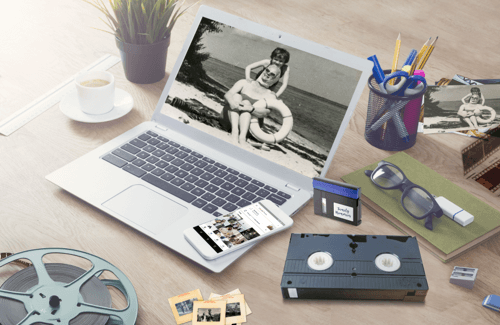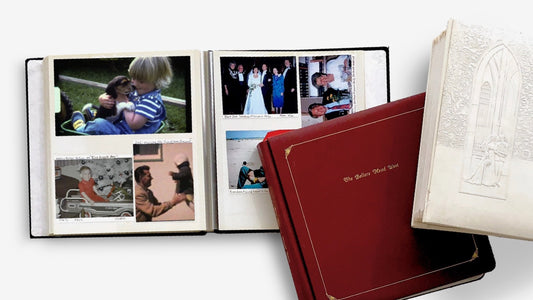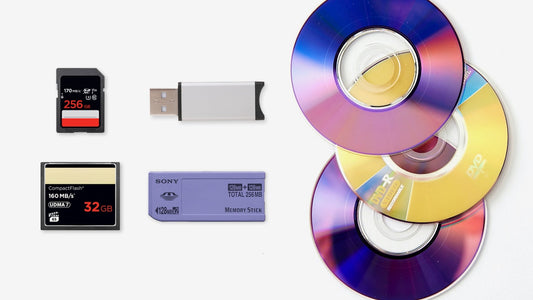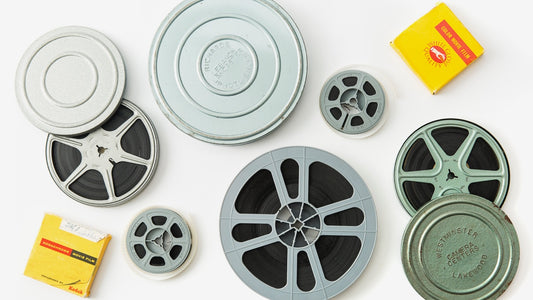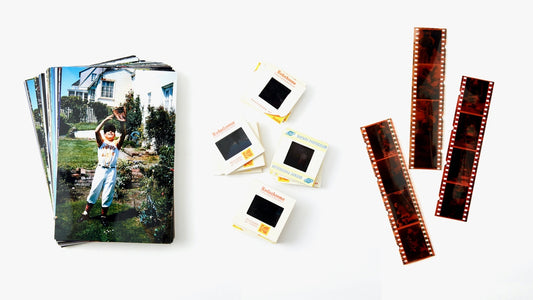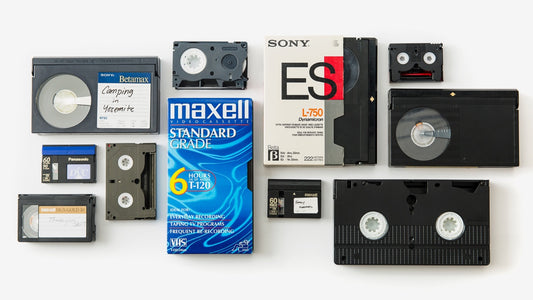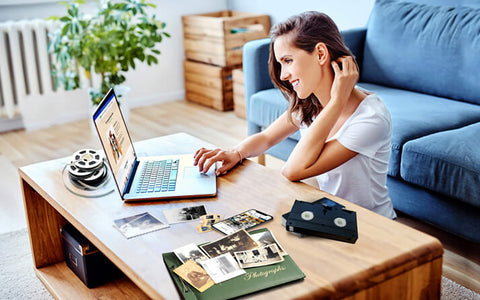Found a box of old VCR tapes? You're holding a real treasure trove of memories. But that wave of nostalgia often comes with a practical question: what do you do with them now? Those tapes contain priceless moments, from baby’s first steps to unforgettable family holidays, but they won't last forever. The technology to play them is also fading fast. This guide will show you exactly what to do with old VCR tapes. We'll cover the best ways to preserve your memories by digitizing them and discuss responsible options for the physical tapes once you've secured their contents.
Key Takeaways
- Assess Your VCR Tapes Thoughtfully: Begin by sorting your tapes to identify which ones hold precious memories for preservation and which can be handled differently, recognizing their materials require careful disposal to protect the environment.
- Safeguard Your Memories by Going Digital: Convert your irreplaceable home movies from VCR tapes to digital formats, ensuring they're protected from decay and ready to be enjoyed and shared for years to come.
- Recycle, Donate, or Upcycle Remaining Tapes: For tapes you've digitized or no longer need, explore responsible options like local e-waste recycling, specialized mail-in services, donating them if they're still watchable, or trying fun upcycling crafts.
Why Your Old VCR Tapes Are an Environmental Puzzle
It's easy to look at that dusty stack of VCR tapes and just see old home movies or forgotten films. But those tapes are more than just memories; they also have an environmental story to tell, especially when we think about getting rid of them. Before you decide what to do with your collection, it’s helpful to understand what they’re made of and why tossing them in the trash isn’t the best idea for our planet. Knowing this can help us make more responsible choices for these nostalgic items, ensuring we care for both our memories and the environment.
What Makes VCR Tapes So Hard to Dispose Of?
So, what exactly makes up a VCR tape? Well, they're primarily "made of plastic and contain metal components," as environmental guides like Greenfield ESG point out. This combination of materials is what makes their disposal a bit complicated. The bulky plastic casing, which is the most visible part, can be a real problem. According to The Environmental Literacy Council, this plastic "can take hundreds of years to decompose." During that incredibly long time, they take up precious landfill space and could potentially leach harmful chemicals into the soil and water. This means simply throwing them away can have long-lasting negative effects on our environment, making responsible disposal all the more important.
The Real Reason You Can't Just Toss Old Tapes
Because of what they're made of, how we handle old VHS tapes really does matter. They "pose a unique challenge when it comes to disposal," a point highlighted by resources like the GreenWashing Index. It might seem like a small thing, but when these tapes end up in landfills, they "contribute to several environmental issues," as noted by memory preservation experts at Capture. Choosing a more thoughtful approach rather than just tossing them in the bin is a significant step toward more responsible environmental practices. Every tape we divert from a landfill helps reduce these potential problems, making a collective difference for our planet.
Could Your VHS Collection Be Worth Money?
While sorting through your tapes, you might wonder if you’re sitting on a hidden gem. The short answer is: maybe! While most commercially produced VHS tapes aren't worth much, some rare finds can fetch a surprising amount from collectors. It’s a fun thought, but it’s important to know what to look for. This section will help you figure out if any of your tapes have monetary value and what to do if you think you’ve found one. We'll explore what makes a tape valuable, from its rarity and condition to its genre, and give you some real-world examples of tapes that have sold for a premium.
Distinguishing Home Movies from Valuable Collector's Items
First things first, let's separate the treasures from the treasure. The tapes with handwritten labels like "Susie's 5th Birthday" or "Family Vacation '95" hold immense sentimental value, but they won't attract collectors. These are your personal memories, and their worth is measured in moments, not dollars. The most important thing you can do with these is to protect them from degrading over time. Services like YesVideo specialize in video transfer, carefully converting your home movies into digital files so you can cherish and share them for generations. The tapes we're talking about here are the commercially produced ones—the movies, concerts, or special events you bought from a store.
What Makes a Commercial VHS Tape Valuable?
For a commercial VHS tape to be valuable, it usually needs to check a few specific boxes. It’s not about how popular the movie was, but rather about how rare the specific version of the tape is. Collectors are looking for unique items that are hard to find, often due to specific circumstances surrounding their release. Several key factors can turn a standard VHS tape into a sought-after collectible, including its print run, any controversies tied to its content, and its appeal to a dedicated fanbase. Understanding these details will help you spot a potentially valuable tape in your collection.
Rarity and First Editions
Like with most collectibles, rarity is the biggest driver of value. First editions or early releases from smaller distribution companies are often highly prized. The real jackpot, however, is finding a tape that is still sealed in its original plastic wrap. As experts at CGC Home Video note, most people bought tapes to watch them, so factory-sealed copies are exceptionally rare. A sealed first-edition print of a popular film can be worth significantly more than an opened one, as it represents a perfectly preserved piece of movie history that is almost impossible to find.
Banned, Recalled, or Altered Content
Sometimes, a tape becomes valuable because of controversy. Tapes that were quickly pulled from shelves, banned, or recalled are often sought after by collectors. This could be due to controversial cover art, content that was later edited out, or legal issues that forced the distributor to stop selling it. A famous example is Disney's "The Little Mermaid," which had an early version with cover art that was quickly recalled and changed. These "banned" versions are now collector's items simply because they had such a short and storied time on the market, making them a unique find.
Genre and Cult Following
Certain genres have a particularly dedicated following in the VHS collecting community. As noted by digitization service Capture, vintage horror films and cult classics are especially popular. Fans of these genres are often passionate about owning the original media, appreciating the nostalgic box art and the authentic viewing experience. Movies that may have been panned by critics or had a limited theatrical run can develop a cult following over time, making their original VHS releases highly desirable. Tapes from small, defunct horror distributors are particularly prized for their rarity and unique cover art.
The Importance of Condition and Grading
Even if you have a rare tape, its condition is critical to its value. A tape that is in excellent shape, with a crisp, clean sleeve and no damage to the cassette itself, will always be worth more. The cardboard sleeve should be free of tears, fading, or water damage. For high-value tapes, some collectors even pay to have them professionally graded by services that assess their condition and encase them in a protective shell. A high grade can significantly increase a tape's market price, confirming its authenticity and state of preservation for potential buyers and ensuring it remains in pristine condition.
Examples of High-Value VHS Tapes
So, what are some of these valuable tapes? While you probably won't find a tape worth six figures in your attic, some well-known titles have a history of selling for impressive amounts. These are often sealed, graded, first-edition copies of iconic films. The list includes everything from blockbuster hits that everyone owned to obscure horror flicks that very few people have ever heard of. Looking at these examples can give you a better idea of the types of tapes that have become valuable in the collector's market and why they stand out from the rest.
Blockbuster Hits
It might seem counterintuitive, but some of the most popular movies ever made can be among the most valuable VHS tapes—if you have the right version. Sealed and professionally graded copies of blockbusters like "Star Wars," "Back to the Future," and "The Goonies" have sold for tens of thousands of dollars at auction. The key here is the combination of pristine, unopened condition and an early, original print run. These sales are driven by high-end collectors who want to own a perfect, untouched piece of cinematic history from their childhood.
Disney's Black Diamond Collection
You’ve likely heard the rumors about valuable Disney tapes. The "Black Diamond Collection," released between 1984 and 1994, is often at the center of these discussions. While most used copies aren't worth much, sealed versions of certain titles like "Beauty and the Beast" or the aforementioned "The Little Mermaid" with its banned cover art can be valuable to the right collector. The "Black Diamond" label, found on the spine of the case, indicates it's part of this specific series, which was Disney's first attempt at selling its animated classics directly to consumers.
Cult and Horror Classics
The horror genre is a hotbed for collectible VHS tapes. Early releases of iconic horror films, especially from distributors like Media Home Entertainment or Wizard Video, are highly sought after. For example, original VHS copies of "The Texas Chain Saw Massacre" and "Halloween" are prized by fans. These tapes are valued not just for the film itself but for their iconic, often graphic, box art that captured the gritty aesthetic of the era. For horror aficionados, owning these original releases is like owning a first-edition book from a favorite author.
Where to Sell Your Collectible Tapes
If you've sorted through your collection and believe you have a valuable tape, your next step is finding the right buyer. You have a few different avenues to explore, depending on the tape's potential value and how much effort you want to put into the sale. The most common route is online marketplaces, which give you access to a global audience of potential buyers. For exceptionally rare or high-value items, you might consider more specialized platforms where serious collectors gather. Choosing the right place to sell can make a big difference in the final price you receive.
Online Marketplaces
For most sellers, eBay is the best place to start. It has a massive, built-in audience of collectors from around the world, making it a great place to gauge interest and find a buyer. To get the best price, be sure to take clear, detailed photos of the tape and its case from all angles, and write an honest description that highlights its condition and any unique features. It's also a good idea to research what similar tapes have recently sold for to set a realistic price for yours.
Collector Forums and Auctions
If you have a particularly rare or high-value tape, you might have better luck in more specialized venues. Online forums and social media groups dedicated to VHS collecting can connect you directly with serious, knowledgeable buyers who are willing to pay top dollar for rare finds. For tapes that could be worth thousands, professional auction houses that specialize in pop culture memorabilia are another option. These platforms can help authenticate your item and market it to a curated list of high-end collectors, ensuring you get the best possible return.
How to Responsibly Recycle or Dispose of VCR Tapes
So, you’ve taken the wonderful step of preserving your precious home movies by digitizing your VCR tapes – fantastic! Now, what about those stacks of old cassettes? Before you think about the trash can, it's worth knowing that VCR tapes contain materials like Mylar plastic and various metals that don't break down easily and can contribute to landfill issues. Making a conscious choice about their disposal is a great way to be kind to our planet. The good news is there are several responsible ways to handle them after you've secured your memories digitally. Let's look at some practical options for recycling or properly disposing of your old VCR tapes.
Find Local E-Waste Recycling Events
Your first port of call for responsible tape disposal should be your local community resources. Many towns and cities have dedicated recycling centers or host periodic e-waste collection events specifically for items like VCR tapes and other old electronics. These events ensure that your tapes are dismantled and processed in an environmentally sound way. You can usually find information about these programs by checking your city or county’s official website under the waste management or recycling section. Another great tool is searching online databases; for instance, Earth911 allows you to search for e-waste recycling solutions for VHS tapes just by entering your zip code.
Use a Mail-In Recycling Program
If you find that local options are limited or not available in your area, don't lose heart! Several mail-in programs specialize in recycling electronic media, including VCR tapes. For example, GreenDisk is a well-known service that accepts various types of media, including VHS tapes, for secure and proper recycling. You simply pack up your tapes and send them off. While these services often involve a small fee to cover their processing and handling, it’s a convenient and reliable method to ensure your tapes don’t end up in a landfill. Some electronics manufacturers occasionally offer take-back programs, but these are generally less common for older media formats like VCR tapes.
Quickly Find a Recycling Option Near You
Finding the right place to recycle your VCR tapes might require a little bit of active searching, but it’s a worthwhile effort for our planet. Beyond official e-waste events or established mail-in services, sometimes smaller, local electronic repair shops or community-led recycling initiatives might accept them. A good starting point is to search online using terms like "VCR tape recycling near me" or "e-waste disposal [your city/town name]" to see what options are available in your vicinity. Every tape you divert from a landfill is a small win for reducing waste. Taking those few extra minutes to find a proper disposal method really does help support broader recycling efforts and a healthier environment.
Give Your Old Tapes a Second Life: Donate or Upcycle
So, you've taken that wonderful step to preserve your cherished memories by converting your VCR tapes, perhaps with a service like YesVideo's video transfer, and now you're looking at a pile of old tapes. Before you even think about the trash can, let's talk about giving them a second act! It’s amazing what you can do with these seemingly outdated items. You can either pass them on to folks who might still get some joy out of them or tap into your inner artist with some really fun upcycling projects. It’s all about finding a new purpose, which not only feels good but is also a nice nod to sustainability.
Think about it – even if the tapes don't hold your personal family moments, the movies or shows on them might be a treat for someone else. And if you're feeling a bit crafty, the tapes themselves are a surprisingly cool material to work with. It’s a fantastic opportunity to reduce waste, get creative, and maybe even discover a new hobby. Let's explore a couple of great options for those old VCR tapes.
Where Can You Donate VHS Tapes?
If your VCR tapes are still in good shape and contain movies, classic TV shows, or even cartoons, there are quite a few places that might be thrilled to receive them. Consider local spots in your community that could use them for entertainment. Libraries, schools, daycare centers, and even nursing homes sometimes welcome VHS donations. Thrift stores like Goodwill are often another excellent option, as they can resell them to support their charitable work.
The most important tip here is to always call ahead. Donation policies can change, and a quick phone call will confirm if they're currently accepting VHS tapes. This saves you a trip and ensures your tapes go where they're truly wanted. Some libraries, for example, might add them to their fundraising sales, while retirement communities could use them to host movie afternoons for their residents, bringing a bit of joy and nostalgia.
Creative Ways to Upcycle Your VHS Tapes
Feeling inspired to create something new? Old VCR tapes can be a goldmine for craft projects! That shiny black magnetic tape can be woven or crocheted into surprisingly sturdy and unique items, and the hard plastic cases have endless repurposing potential. You could transform them into quirky storage containers for small items, unique decorations, or even components for small DIY furniture.
A quick online search for "DIY VHS tape crafts" will open up a world of inspiration. People make everything from durable tote bags and funky rugs by weaving the tape, to little planters or photo displays using the cases. It’s a really enjoyable way to give these old items a completely new identity and add a personal, handmade touch to your home or accessories.
DIY Projects: From Tape Art to Home Decor
Choosing to upcycle your VCR tapes is more than just a fun weekend activity; it’s a fantastic way to be resourceful and cut down on waste. Both the outer plastic cassette shells and the inner magnetic tape offer unique properties for creative reuse. Imagine using a collection of cases to build an interesting photo frame or even a modular mini-shelf. The tape itself, when treated like yarn, can be knitted or crocheted into surprisingly resilient fabric.
Many artists and crafters have found some truly innovative ways to repurpose VHS tapes, turning them into everything from eye-catching sculptures to unique fashion accessories. Even if you're not aiming for an art gallery piece, simply repurposing the cases as drawer organizers or small storage boxes for craft supplies can be incredibly practical and give these old items a useful new life in your home.
Don't Lose Your Memories: How to Digitize VCR Tapes
Those old VCR tapes tucked away in your attic or basement? They're not just plastic and magnetic tape; they're treasure chests filled with precious family moments, laughter, and milestones. But VCR tapes weren't made to last forever, and the players themselves are becoming quite rare. The wonderful news is you can bring those memories into the present by converting your VCR tapes to digital formats. This way, they're safe from the wear and tear of time and so much easier to watch and share with loved ones, anytime, anywhere. Imagine easily pulling up that hilarious birthday party from decades ago on your phone or computer!
Hiring a Pro to Convert Your Tapes
Let's be honest, figuring out how to convert old media can feel a bit daunting, especially when those tapes hold such irreplaceable memories. If you want to ensure your home movies are handled with care and transformed into high-quality digital files without any tech headaches, professional digitization services are a fantastic option. Companies like us at YesVideo specialize in video transfer, taking your cherished VHS tapes and expertly converting them. You simply send in your tapes, and experienced technicians handle the entire process. It’s a convenient and reliable way to preserve those irreplaceable moments, ensuring they’re ready for future generations to enjoy. Plus, you get the peace of mind knowing your memories are in good hands.
The DIY Guide to Digitizing Your Tapes at Home
If you're a bit tech-savvy and enjoy a good DIY project, converting your VCR tapes at home is certainly an avenue you can explore. You'll need a working VCR (which can sometimes be the trickiest part to find these days!), a video capture device that connects the VCR to your computer, and specific video capture software. The basic process involves playing your tape on the VCR while the capture device and software record the playback in real-time onto your computer. While it can be a rewarding process to manage the conversion yourself, it does require some patience, the right equipment, and a bit of technical know-how to get good results. Be prepared to monitor the conversion, as it happens in real-time—so a 2-hour tape takes 2 hours to convert.
How to Store and Organize Your New Digital Files
Once your precious VCR tapes have been transformed into digital files, the next important step is to make sure they're stored safely and organized so you can easily find and enjoy them for years to come. Think about creating backups; you could use an external hard drive, which is great for storing large video files, or consider a cloud storage service for easy access across different devices and for sharing with family members near and far. At YesVideo, when we digitize your memories, we offer options like a digital download through our secure MemoryCloud, alongside USB drives or DVDs, giving you flexibility. Taking a little time to label your files clearly, perhaps by date or event, will make it so much easier to relive those special moments whenever you wish.
Recycle, Upcycle, or Digitize? Making the Right Choice
Figuring out what to do with that box of old VCR tapes stashed in the attic or closet can feel like a bit of a puzzle. On one hand, they might hold precious memories, but on the other, they're bulky and, let's face it, VCR players aren't exactly standard household items anymore! The good news is you have options, and making a thoughtful choice is easier than you think. It's really important to consider environmentally responsible ways to handle them. As Greenfield ESG points out, you should "Avoid landfill disposal: Do not throw VCR tapes in regular trash, as they contain materials that can be harmful to the environment." This really underscores why we need to find better solutions than just tossing them out. So, let's look at how you can decide the best route for your tapes.
How to Decide What to Do With Your Tapes
First things first, take a little time to go through your collection. What’s actually on these tapes? Are they recordings of old TV shows, or are they irreplaceable home movies of birthdays, holidays, and family milestones? The Environmental Literacy Council wisely notes that "Choosing not to simply throw them away is an important step in responsible environmental practices. Alternatives to landfilling include various avenues for responsible disposal and recycling of VHS tapes." This is a great reminder that we have choices beyond the trash can.
Consider the condition of the tapes too. Are they dusty, moldy, or damaged? This will influence what you can do with them. If they’re packed with priceless family moments, preserving those memories by converting them to a digital format is a wonderful path. For tapes that don't hold sentimental value, recycling or responsible disposal is the way to go. The key is to make an informed decision for each tape, or batch of tapes, rather than a blanket approach.
Creating Your VCR Tape Action Plan
Once you've sorted your tapes by what's on them and their condition, you can create a clear action plan. It doesn't have to be a complicated process. As GreenCitizen assures us, "Getting rid of your old VHS tapes doesn't have to be hard. Find out how to recycle VHS tapes and cassette tapes now with this complete guide." For those tapes you’ve decided aren’t keepers, look into local e-waste recycling programs or mail-in services.
For the tapes filled with cherished moments, your action plan should focus on preservation. This is where services like video transfer come into play, allowing you to safeguard those memories for future generations. By digitizing them, you not only protect them from the degradation that physical tapes inevitably face but also make them incredibly easy to share and enjoy again. No matter which path you choose for which tapes, the goal is to handle them responsibly and thoughtfully.
Still Have Questions About Your VCR Tapes?
Finding a stash of old VCR tapes can feel like unearthing a time capsule, can't it? Those chunky plastic cases hold birthdays, holidays, and everyday moments that are truly priceless. But let's be honest, they also present a bit of a puzzle in our modern, decluttered world. What's the best way to handle them? Can they just be tossed out? What about the environmental side of things? These are all valid and important questions that many of us have. You might also be wondering about the materials inside these tapes and why they can't just go into the regular recycling bin with your paper and other plastics. It's a common concern, and you're not alone in seeking clarity.
The good news is you've got options! And making an informed choice is easier than you think. Whether you're looking to preserve those precious family films by converting them to digital formats that are easy to share and enjoy for years to come, or you're ready to part with some tapes, doing it responsibly is key. This FAQ section is designed to cut through the confusion. I've compiled answers to the most common questions I hear, drawing on reliable sources to give you clear, actionable advice. My aim is to help you feel confident about your decisions, knowing you’re doing right by your memories and the environment. So, let's get your questions answered and find the best path forward for your collection of tapes.
Can I just throw away old VCR tapes?
It’s really tempting to just toss old VCR tapes into the regular trash, especially when you're in the middle of a big decluttering project. However, it's best to avoid this if possible. VCR tapes contain materials that aren't great for the environment if they end up in a landfill. Think about the plastic casing and the magnetic tape itself – these components can release substances you wouldn't want seeping into the earth. Experts at Greenfield ESG advise that you "Do not throw VCR tapes in regular trash, as they contain materials that can be harmful to the environment." So, before you head to the curb, let's explore some better alternatives for those old tapes.
What happens to VCR tapes in a landfill?
This is a great question, and understanding the answer really highlights why mindful disposal is so important. When VCR tapes end up in landfills, they stick around for a very, very long time. The plastic casing, for instance, can take hundreds of years to decompose. During this long period, they take up valuable landfill space. More concerning, as The Environmental Literacy Council points out, these tapes can potentially leach "harmful chemicals into the soil and water." Imagining that makes it easier to see why finding an alternative to the landfill is a responsible step for anyone looking to manage their old media. It’s about minimizing our long-term impact on the planet.
Why is recycling VCR tapes so important?
Recycling VCR tapes, or at least disposing of them responsibly, might seem like a small action, but it’s a significant part of being environmentally conscious. These tapes are a form of electronic waste, or e-waste, and contain plastics and metals that can be recovered and reused if processed correctly. When we choose not to simply throw them away, we're helping to reduce the amount of waste going into landfills and lessening the potential for environmental contamination. As The Environmental Literacy Council aptly puts it, "Choosing not to simply throw them away is an important step in responsible environmental practices." It’s about making a thoughtful choice for our planet and future generations.
What are my options for recycling old VCR tapes?
So, you’ve decided against the landfill – fantastic! The next step is figuring out how to recycle your VCR tapes. It's true that they aren't usually accepted in curbside recycling programs, but there are specialized e-waste recycling facilities or services that can handle them. These places are equipped to break down the tapes and recover usable materials. Some communities host e-waste collection events, or you might find mail-in programs. For a good starting point, Legacybox offers a guide that discusses eco-friendly methods for disposing of old tapes and reducing electronic waste. A little research into local options can go a long way in finding a suitable recycling solution.
Where can I find more recycling information?
It's completely normal to have more specific questions, especially since recycling guidelines can vary quite a bit from place to place. If you're wondering about local e-waste events, drop-off locations for VCR tapes, or what to do with other household hazardous waste, your best bet is to reach out to your local waste management authority. They can provide the most accurate and up-to-date information for your specific area. For example, LA County Public Works advises residents to contact them directly for such queries by visiting their website or calling their hotline. A quick call or visit to your local government's public works or environmental services website should point you in the right direction.
Is there a complete guide for recycling VHS tapes?
Yes, absolutely! If you're looking for a comprehensive resource, you're in luck. Several organizations and environmentally-focused websites have put together detailed guides on how to properly recycle VHS tapes and even other old media like cassette tapes. These guides often cover the "why" as well as the "how," explaining the types of materials in tapes and the different recycling avenues available. For instance, GreenCitizen provides a complete guide that can help you understand the process better and find suitable options. These resources are super helpful for navigating the specifics and ensuring your tapes are handled responsibly from start to finish.
Related Articles
- VCR to Digital: 2023 Guide to Converting Tapes – YesVideo
- Convert VCR to DVD: 2023 Guide + Best Converters – YesVideo
- Top 5 VCR to Digital Converters for Preserving Memories – YesVideo
- Change VHS to DVD: Easy Step-by-Step Guide – YesVideo
- Digitize VCR Tapes: The Ultimate Guide for 2024 – YesVideo
Frequently Asked Questions
Why can't I just toss my old VCR tapes in the regular trash bin? It might seem like the simplest solution, but sending VCR tapes to the landfill isn't ideal for our planet. Those tapes are made of plastics and other materials that take an incredibly long time to break down. During that time, they occupy valuable landfill space and can potentially release substances that aren't great for the soil and water. Thinking about more responsible options is a kinder choice for the environment.
My town’s recycling program doesn’t accept VCR tapes. What should I do then? That's a common situation, as VCR tapes often require special handling. Don't worry, you still have good options! Look into e-waste collection events that your community might host periodically. Another route is to search for mail-in recycling programs that specialize in electronic media; these services can take your tapes and ensure they're processed correctly. A quick online search for "e-waste recycling near me" can also turn up local drop-off points you might not know about.
I’ve saved all my home movies digitally. Are there any fun or useful things I can do with the actual tapes now? Absolutely! Once your precious memories are safely digitized, the physical tapes can find a new purpose. If they're store-bought movies or shows, consider donating them to libraries, schools, or thrift stores – just call ahead to see if they're accepting them. If you're feeling crafty, the tape ribbon can be woven into unique items, and the plastic cases can be repurposed for organizing small craft supplies or other household bits and bobs.
My VCR tapes seem fine in their boxes. Why is it so important to convert them to digital? Even if your tapes look okay on the outside, the magnetic ribbon inside them degrades over time, which can affect the picture and sound quality of your irreplaceable memories. Plus, finding a working VCR player is becoming increasingly difficult! Converting your tapes to digital files means your home movies are preserved in a stable format that won't wear out, and you can easily watch and share them with family and friends on modern devices for many years to come.
What exactly is in a VCR tape that makes it so tricky to dispose of? VCR tapes are a mix of materials, primarily a hard plastic outer shell and the inner magnetic tape, which is a type of Mylar plastic coated with metallic particles. This combination doesn't break down easily in landfills, and the mixed materials make them unsuitable for your standard curbside recycling bin, which is typically set up for simpler plastics, paper, and glass. That's why specialized recycling or disposal methods are recommended.





